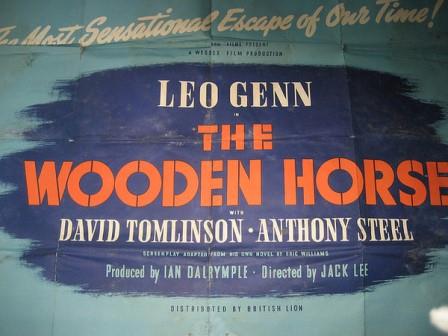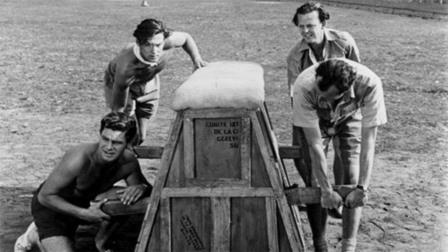Charged with high voltage excitement!
Prison escape films- particularly films set in POW camps- conjure up images of the great films The Great Escape or Stalag 17 (though the latter isn’t anything close to a classic escape film). A lesser known but equally strong entry in the category is the 1950 British film The Wooden Horse.
Set in the same camp (Stalag Luft III) as the subsequent The Great Escape, The Wooden Horse is an almost typically British film. There’s little outright action and most of the dialogue is spoken quietly in almost a monotone- due likely to the use of many non-actors in the cast who were former prisoners of war themselves. Even in its high points it’s still extremely subdued and dry.
Giving a clue as to what’s about to happen, the film opens with a message that it’s every prisoners duty and perhaps goal to escape and return to action. Showing the camaraderie and elan often seen in such films, a group of British prisoners band together in their efforts to have a few of their companions escape. Knowing that the distance from their barracks to the perimeter fence is too long for a tunnel, they come up with a creative solution (and the movie’s namesake).
They create a “wooden horse” which they use to aid in gymnastics exercises. Unbeknownst to the Germans, they cleverly hide prisoners inside the horse who dig while the balance of the prisoners exercise. The term horse is well used both as it alludes to the famous Trojan Horse and also the piece of gymnastics equipment. A key point is on its initial use (when it didn’t have a prisoner in it) they have one prisoner intentionally misjudge his vault and overturn the horse, exposing its underside and dispelling any doubts the Germans may have had about it.
It’s all extremely well done up until the point where the escapees leave the camp. Strangely the momentum in the film that has been built up until that point dissipates ever so slightly and the escapees travel to Lubeck and Denmark before finally reaching Sweden. Sadly, the ending is a bit abrupt, perhaps exacerbated somewhat by production costs, which were well over budget.
The Wooden Horse was filmed mostly on location both in Germany and spots along the escape route, giving the film added realism that is sadly missing in latter productions. Ironically though filmed on location, the camp itself had to be rebuilt as all the extant prisoner of war camps in Germany were still in use, this being only a few years after the end of the war.
What makes the film so good and in many ways better than its more familiar companion The Great Escape is that British touch. It’s gritty and real where later films are flamboyant and fabricated. Rather than a exhilarating motorcycle ride (as in The Great Escape) we have an anxious trip down a dark side street. Also the Germans aren’t made to be fools or stupid just to make the British look better; clearly they are viewed as a worthy adversary to be wary of. In typical dry style, when a visiting doctor hears the prisoners playing Beethoven he exclaims, “Ah, he was a good German.” From the back you hear, “Yes. He’s a dead one,” as a quick retort.
Featuring the true story of Eric Williams, there is a lot to like about The Wooden Horse. Sadly, it’s still hard to find but well worth the search.
[embedyt] https://www.youtube.com/watch?v=ft3t5dRStyA[/embedyt]

